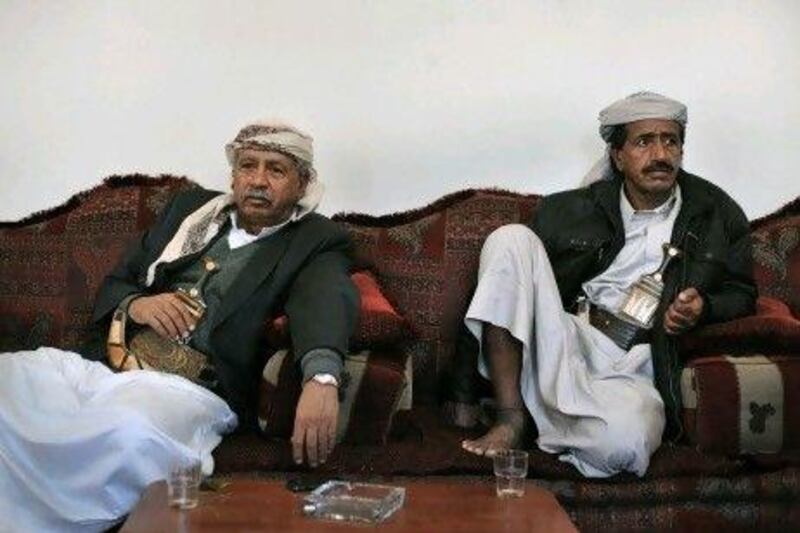ARHAB, YEMEN // When dealing with Yemen's powerful tribes and clans, no one was shrewder than Ali Abdullah Saleh.
Until the start of protests last year that eventually forced him from office after 33 years as president, Mr Saleh managed them with a deft hand, knowing which of their leaders to buy off and which to punish, and when to play them off each other to secure his rule.
As pressure from his opponents escalated, Mr Saleh's nimble touch with Yemen's convoluted tribal networks faltered.
Still, his successor, Abdrabu Mansur Hadi, will need all of Mr Saleh's skill that he can muster to usher in the post-Saleh era and set the stage for parliamentary elections in two years, according to analysts, politicians and tribal leaders.
"A major test is whether he can actually bring the tribes and these types of factions together for a new social contract," said Riad Kahwaji, the head of the Dubai-based Institute for Near East & Gulf Military Analysis. "The system that was applied to the country for decades is now gone and a new one has to come into place."
Whatever the contours of that "new social contract", Yemen's tribes will play an major role.
The largest tribal confederations - Hashid, Bakil and Madhaj - support millions of people through tangled offshoots of sub-tribes, clans and extended families that provide order and stability in the absence of a strong central government.
Yemen's permutations in the 20th century - its independence from the Ottoman Empire in 1918, followed by its division into North and South Yemen in 1967 and reunification 23 years later - have not altered the centuries-old importance of these loyalties. They still determine livelihoods and who gets ahead in today's Yemen.
But placing them into a neat hierarchy is practically impossible, said Gregory Johnsen, a Yemen expert and doctoral candidate in Princeton University's Near Eastern Studies department.
He said that "tribe" was really a catch-all term to define Yemen's loyalties. Mr Johnsen said that without strong government institutions, loyalties to tribes and their derivatives were perpetually in flux as leaders jockey for power by forming and breaking alliances with each other.
"Yemen has a weak central state so getting people to buy into the state and pledge allegiance to it is difficult, and getting them to ignore these other [tribal, clan and family] loyalties is a fairly gargantuan task," Mr Johnsen said.
Mr Saleh cleverly managed Yemen's tribalism to remain in power for years, but that changed last year amid escalating opposition to his rule.
Some of his longtime tribal allies threw their support behind his opponents out of the belief that he was no longer fit to govern Yemen.
Others were more pragmatic, defecting from the president's side only when it became clear he could not survive in power.
That exposed rifts within tribes and clans that had been firmly tied by intermarriage and patronage to Mr Saleh, such as the Abu Shawareb clan, part of the Hashid confederation.
Tribal heads and their followers played a key role in Mr Saleh's downfall, as his divide-and-conquer tactics failed him.
"He tried to get us to hate each other, creating rivals out of us," recalled Mufarih Bahaibih, a tribal leader in the governorate of Marib.
Heavily armed tribal militias carried out continuous attacks on loyalist military bases 40 kilometres north of the capital. That prevented many of the government's tanks from rolling into Sanaa to crush anti-government protesters.
Many others joined with anti-Saleh militants led by the powerful Ahmar clan, which had accumulated much wealth under Mr Saleh's rule before turning on him.
"Simply - they found a better deal," said Khaled Al Akwa'a, a professor of political science at Sanaa University.
As the turmoil tore at the seams of Yemeni society, tribal leaders and some of their followers showed a darker side, resorting to kidnapping foreigners to extort concessions from Mr Saleh's regime.
"Tribalism presented both its best and worst attributes during the uprising," Mr Al Akwa'a said.
The best, he said, was the protection and financial support tribes offered their people during last year's violent upheaval.
The worst was the instability inherent to tribalism's flimsy allegiances.
"When they saw Saleh as a powerful ruler, they tended to back down," Mr Akwa'a said. "But when they had room to exploit, they did."
Some observers believe that Mr Hadi, the new president, cannot hope to rebuild Yemen's pre-uprising tribal coalitions, let alone grapple with its legacy of rewarding tribal leaders with influential posts in the military and security services.
Besides, they say, that system is struggling to address the difficulties Yemen faces, particularly the lack of basic services such as education and water delivery.
"The tribal system is unable to address the current challenges, such as increasing poverty and the new issues facing the youth," said Nadwa Al Dawsari, the founder and executive director of Partners Yemen, which provides development support in tribal governorates such as Shabwa and Al Jawf.
Issues such as a precipitous decline in oil revenues since 2003 hurt the state's delivery of municipal services and development.
As a result, said Ms Al Dawsari, tribal leaders had become increasingly desperate for support.
"This has created more conflict over things like access to water and the decreasing number of development projects in their areas," she said.
For Ms Al Dawsari, the question is not whether Mr Hadi can match his predecessor's prowess in dealing with Yemen's tribes, it is whether the tribal system itself is beyond recovery.
"His problem is that he will face a vacuum because the system of tribal rule is weakening and there is no rule of law to replace it," she said.
Follow
The National
on
[ @TheNationalUAE ]
& Hugh Naylor on
[ @HughNaylor ]





